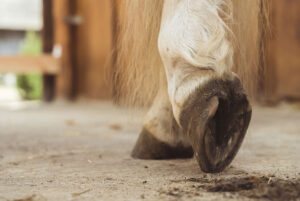Fundamentals Of Foaling
- Topics: Article, Foaling & Foaling Problems, Mare Care
To understand some of the unusual aspects of birth in horses, it is helpful to consider how the species survived before domestication. The horse’s defense against predators always has been flight. The strongest and fastest survived and passed on their genes related to speed and agility. But what about the newborn?
Adaptation made the foal one of the most precocious newborns of the animal kingdom. It must be delivered quickly, in a favorable location, and be ready to travel, fast, with its mother in a matter of hours. To a large extent, all of these characteristics remain in horses of today.
Given the opportunity, mares will seek secluded and secure places to deliver their foals. They can interrupt delivery up to the last critical minutes if danger is perceived. Ideally, they will wait until darkness to gain extra cover and time. Then, when committed, they produce the foal rapidly, rise quickly to guard it, and in a few hours are ready to lead it away. All of which explains the behavior of mares under the controlled conditions we tend to impose upon them.
Management systems that give mares freedom of choice about foaling are fairly common in milder climates and with breeds where the individuals are moderate in value. Groups of mares running on large pastures, with some cover, do a pretty good job of foaling, with few complications. The problem is that the complications, which often occur at night, are difficult to correct in time to save the foal, and occasionally the mare. Thus ,the standard of care for foaling mares has moved toward intensive observation and immediate assistance. This situation, driven by the value of the breeding stock, is unfortunate in that it not only is very expensive and time consuming, but also is less than ideal for both dam and offspring
Create a free account with TheHorse.com to view this content.
TheHorse.com is home to thousands of free articles about horse health care. In order to access some of our exclusive free content, you must be signed into TheHorse.com.
Start your free account today!
Already have an account?
and continue reading.
Related Articles
Stay on top of the most recent Horse Health news with


















